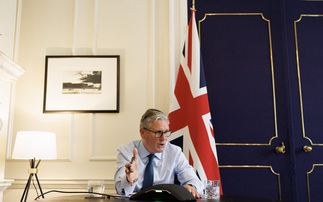I'll be voting to Remain and hoping that whatever the result it triggers a rethink in politicians' short termist economic approach
Less than 24 hours to go and is there anything left to say about the EU referendum that hasn't been said ad nauseum already?
Despite the Leave camp's well documented desire to say little of any detail on environmental issues, the debate across the green economy has been wide-ranging and comprehensive.
There are good green reasons to want to leave the EU, chief amongst them the on-going environmental scandal that is the Common Agricultural Policy, the EU's continued failure to deliver a proper carbon price, and the threat posed by a flawed TTIP deal. But there are also good reasons why the vast majority of clean tech trade bodies, green business leaders, and environmental NGO's are preparing to throw their weight whole-heartedly behind Remain tomorrow. As I argued last week, the risk Brexit would result in economic turmoil, coupled with the increased likelihood of a government staffed by ideologically motivated climate sceptics far outweighs any potential benefits. That is why I'm voting Remain.
But there is another reason. The EU, for all its imperfections, has a long term goal of building the sustainable, low carbon, healthy, prosperous and peaceful economy we desperately need. It may struggle to deliver on this vision, but that is the stated goal. I'm yet to be convinced the same goal is shared by many of the Leave camp's leading lights. I'm absolutely convinced that even if they share this goal their route for reaching it is reckless in the extreme, based on narrow populism, discredited laissez faire economics, and a 'cross your fingers and hope for the best' approach to technology and the environment.
Faced with immense global challenges, from climate change to mass migration (which as a result of climate change is not going to go away, regardless of whether we leave the EU or not) it feels simply wrong to turn our backs on our nearest neighbours. We are entering an age of rapid transformation, where digital and clean technology, cultural and political cross-pollination, and environmental pressures will quickly change the way we all live and work. As no less a sage than Delia Smith has argued we are entering an era of openness and international collaboration, a fact that was highlighted by the historic delivery of the Paris Agreement. That night in Paris showed our better angels can win out; a shared pursuit of a shared endeavour to tackle a shared challenge is possible. In fact, it is our last best hope.
Some advocates of Brexit argue they want to leave the EU to turn outwards to face the world, but their narrow and dispiriting campaign has told a very different story. Now is precisely the wrong historical moment to succumb to the temptations offered by the lies peddled by quick-fix nationalism. The huge opportunities that come with openness and the scale of the collective risks we all face make co-operation with neighbours both near and far not just rational, but essential. The EU at its best continues to embody that spirit of peaceful collaboration. That is why I'm voting Remain.
However, before everyone's focus inevitably turns to the fallout from tomorrow's vote it is worth reflecting on three immense challenges that have been thrown up by the campaign and will need to be tackled regardless of which way the vote goes.
We need to find a way to tackle post-truth politics
The Observer's Andrew Rawnsley argued at the weekend that the campaign has "introduced a novelty to British politics: the persistence with a lie even when it is verifiably a lie". But as several commentators noted, this is anything but unique to the field of climate politics - we've been dealing with cherry-picked data, contempt for expert opinion, conspiracy theorising, and wilful confusion between historical fact and informed prediction for years.
With many of the same personalities to be found in the UK's climate and Euro-sceptic camps the climate denialist playbook has been imported pretty much wholesale into the Vote Leave campaign. A group of campaigners from the very heart of the 'elite' have denigrated independent experts, downplayed credible risks, offered evidence-light silver bullet solutions, and attempted to paint opponents as shills for corrupt higher powers. It has all felt very familiar for any veteran of the climate 'debate'. The campaign had become exhausting, enervating, and emetic even before it was last week punctuated by the most horrifying violence.
This Leave campaign engine, fuelled by a cavalier attitude to evidence and basic principles of risk management, now risks polluting the entire body politic. Political and business leaders of all stripes need to find a way to stop it in its tracks.
Intriguingly, last night's TV debate suggested the Remain camp had opted for a new approach for tackling vague, post-truth assertions: all-out attack. Time and again Sadiq Khan and Ruth Davidson branded Leave claims as 'lies' and called out their opponents for trying to deceive the audience with simplistic promises they could never deliver.
Back in the climate debate, the Obama administration has sought to take a similar approach over the past few years, pulling no punches as the President angrily laid into climate scepticism at every opportunity. "If anybody still wants to dispute the science around climate change, have at it," he declared earlier this year.
Does this bullish approach work? Or does it serve to further alienate an audience, which, due to a whole host of factors, is increasingly dismissive of expert opinion and angry at elitist preaching? Either way an effective antidote to post-truth politics needs to be found, because without it we risk a further loss of trust in politics and a growing sense of alienation that could easily translate into an electoral punishment beating for mainstream, centrist parties at the next election. Under such a scenario, the policies required to build a sustainable economy become even harder to deliver - just ask those Democrats and respectable Republicans currently wrestling with the rise of Trumpism.
We need to get back to work
The UK political community has been locked in campaign mode for much of the past 18 months, and in the brief respite allowed for actual governing the government's energy and climate change priority was the slashing of clean energy subsidies, scrapping of crucial carbon capture projects, and rolling back of green building standards. The net result is that several years of encouraging clean tech deployment records are likely to be followed by an investment hiatus, just at the point when other countries are preparing to press the post-Paris Agreement accelerator.
There is Westminster Village talk Amber Rudd is earmarked for a post-referendum promotion, meaning a new head honcho at the Department of Energy and Climate Change may be needed. But whatever the result and whoever finds themselves responsible for UK energy and climate policy, a long and urgent to-do list awaits.
Ideally before the end of this year, the government should agree a new fifth carbon budget; deliver a plan for meeting the fourth and fifth carbon budget; confirm how it intends to meet its coal phase out goal; reveal the level of funding available for clean energy post-2020; deliver the next clean energy contract auction; resolve the Hinkley Point deadlock; develop a new CCS strategy; tackle stalled recycling rates; accelerate the smart meter and smart grid roll outs; deliver a better plan for renewable heat and transport; ratify the Paris Agreement; and move forward with legislation to set a net zero emission economy goal. Ministers may have to achieve all this while also negotiating how Brexit would impact the energy industry.
The compelling value proposition offered by clean technologies mean green businesses will continue to prosper whether the UK remains in the EU or not, but a short to medium term investment hiatus will only be avoided if the government gets back to the basic business of governing with immediate effect.
We need to get long term thinking back into our governance
The referendum has been a stunning rebuke to political short termism. It was offered by the Prime Minister as a short term response to the UKIP insurgency, the campaign has been fuelled by the anger unleashed by short term austerity policies that have left public services creaking, and the debate has been dominated by the promise of short term responses to immigration and the threat of short term economic crisis.
The need for a long term economic strategy that extends beyond a vacuous soundbite and genuinely seeks to offer hope and prosperity to those communities that have got a raw deal from globalisation has never been clearer. A government without a long term vision always risks leaving itself exposed to the allegation it is self-serving and lacks a purpose beyond the pursuit of power. The failure since 2008 (and arguably long before) of centrists on all sides to offer such a vision is one of the main reasons political discourse has become so squalid and the Referendum will be so close.
As think tank Green Alliance argued this week the green economy can help offer such a vision, providing well paid, high-skilled and satisfying jobs right across Europe, improving quality of life and environment, generating taxes that can help better manage the pressures of migration, and delivering the housing and infrastructure a modern country needs. The problem is the only way to deliver such a vision is with a shift in political priorities where long termism is celebrated and public spending and effective policies are regarded as an investment, rather than a cost.
Each of these three challenges urgently needs tackling regardless of which way tomorrow's vote falls. But it goes without saying that they will be a lot easier to address if the UK remains in the EU, than it will be if it throws itself into years of complex exit negotiations. That is another reason why I'm voting Remain.











